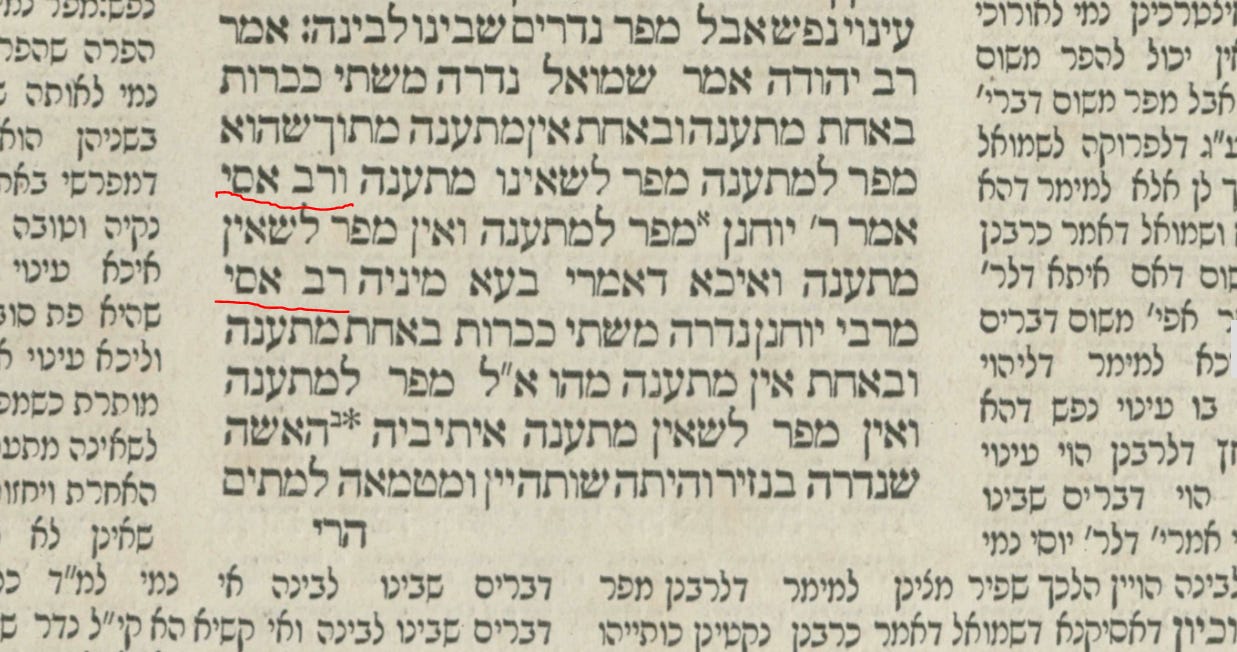Rabbi Assi Misplaces His Yud
This post should be le’iluy nishmas my mother, Leah Nacha bas Moshe Dov.
Historically, we know of Biblical figures who gained or lost letters. For instance, Saray became Sarah. And her yud went to Hoshea ben Nun so that he became Yehoshua.
In Nedarim 82b, there's a dispute between Rav Yehuda citing Shmuel and R’ Assi citing Rabbi Yochanan about nullifying half or all of a neder.
אָמַר רַב יְהוּדָה אָמַר שְׁמוּאֵל: נָדְרָה מִשְׁתֵּי כִכָּרוֹת, בְּאַחַת מִתְעַנָּה, וּבְאַחַת אֵין מִתְעַנָּה, מִתּוֹךְ שֶׁהוּא מֵפֵר לַמִּתְעַנָּה — מֵפֵר לְשֶׁאֵינוֹ מִתְעַנָּה. וְרַב אַסִּי אָמַר רַבִּי יוֹחָנָן: מֵפֵר לַמִּתְעַנָּה, וְאֵין מֵפֵר לְשֶׁאֵין מִתְעַנָּה.
§ Rav Yehuda said that Shmuel said: In a case where a woman vowed that two loaves are forbidden to her, and if she abstains from one of them she would deprive herself, as it is a fine-quality loaf, and if she abstains from the other one she would not deprive herself, as it is a poor-quality loaf, then, since the husband can nullify the vow with regard to the loaf that would cause her to deprive herself, like any other vow of affliction, he can also nullify the vow with regard to the loaf that would not cause her to deprive herself.
And Rav Asi said that Rabbi Yoḥanan said: The husband can nullify the vow with regard to the loaf that would cause her to deprive herself, but he cannot nullify the vow with regard to the loaf that would not cause her to deprive herself.
וְאִיכָּא דְּאָמְרִי, בְּעָא מִינֵּיהּ רַב אַסִּי מֵרַבִּי יוֹחָנָן: נָדְרָה מִשְׁתֵּי כִכָּרוֹת, בְּאַחַת מִתְעַנָּה וּבְאַחַת אֵין מִתְעַנָּה, מַהוּ? אֲמַר לֵיהּ: מֵפֵר לַמִּתְעַנָּה וְאֵין מֵפֵר לְשֶׁאֵין מִתְעַנָּה.
And some say a different version of this dispute, according to which Rav Asi raised a dilemma before Rabbi Yoḥanan: In a case where a woman vowed not to eat from two loaves of bread, and if she abstains from one of them she would deprive herself, and if she abstains from the other one she would not deprive herself, what is the halakha? Rabbi Yoḥanan said to him: The husband can nullify the vow with regard to the loaf that would cause her to deprive herself, but he cannot nullify the vow with regard to the loaf that would not cause her to deprive herself.
Our printed Vilna Venice text, Artscroll, Koren, Steinsaltz, and Sefaria all have this as Rav Asi.
I find this surprising because I maintain that it is Rabbi Asi, not Rav Asi, who was Rabbi Yochanan’s student. Rav Asi was a first-generation Amora of Bavel, a contemporary of Rav. Meanwhile, Rabbi Ami and Rabbi Asi were colleagues and third-generation students of Rabbi Yochanan. Rabbi Assi started in Bavel where he studied under Shmuel and then moved to Israel.
I’ve sometimes seen hagahot on the side of the gemara emending it, and our better modern texts and translations following that, but that would happen when the manuscripts explicitly have רבי spelled out in full. I would expect — and confirmed it so — that manuscripts have ר’ אסי, such that there is no explicit source from which to correct.
Here is what Hachi Garsinan has. Our Vilna printing:
The Venice printing is inconsistent in the first and second version of this R’ Asi with Rabbi Yochanan interaction, with Rav Asi in the first account and Rabbi Assi in the second.
Something fascinating occurs in the two manuscripts we have. In Munich 95, I’ve underlined Rav Yehuda citing Shmuel and R’ Ami citing Rabbi Yochanan in red:
Note that it is R’ Ami (with a mem) citing Rabbi Yochanan, and also without “Rabbi” spelled out. Also, remember the וְאִיכָּא דְּאָמְרִי, that there were two versions? Munich 95 doesn’t have the second version in which he inquires of Rabbi Yochanan, instead immediately transitioning into the next segment, where he challenges Rabbi Yochanan’s position.
A similar phenomenon occurs for our other manuscript, Vatican 110-111.
Here it is R’ Yossi citing Rabbi Yochanan. The title is again not spelled out in full, but as R’. In terms of Yossi, etymologically this is the same as Asi. It is still an error, but probably prompted by the frequency of the Tanna, Rabbi Yossi, in context. Because the gemara keeps discussing the position of Rabbi Yochanan, explicit in the first Mishna, and ascribed by Rav Huna to all the Mishnayot until the end of this perek / masechet.
And again, the second version of the וְאִיכָּא דְּאָמְרִי, is entirely omitted. This feeds my suspicion that וְאִיכָּא דְּאָמְרִי can refer to printed texts, not (just?) oral reports, and the scribe is assembling variant versions.
Would Rabbi Assi consider this a promotion? On the one hand, he lost his rabbinic title. On the other hand, he has become a first-generation Amora, standing alongside Rav and Shmuel!







